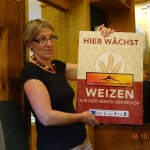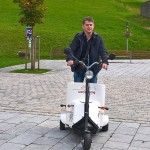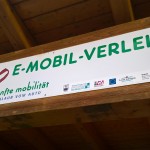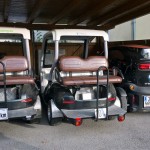Europe Direct in Eastern Latgale laughs experience from Austrian colleagues

Jānis Rimšāne and Madara Burtina, the executive director of the European Direct Information Centre in Eastern Latgale, as well as the Executive Director of the Rēzekne municipality, Janis Troška and Head of Development Planning Unit Anna Jaudzema, went on an exchange of experience on projects financed by the European Union in rural areas of Austria, as well as met the work of the Austrian Europe Direct Information Centre.
On the first day of the visit, the delegation visited the province of Daviszaltsburgh Pongau. As the head of the local Europe Direct Centre and THE LEADER Project Coordinator Stephan Maurer (Stephan Maurer) have said, the projects focus not on the immediate earning of the funds invested but on the preservation of jobs and increasing employment so as to keep as many citizens as possible in the rural area rather than to go looking for work on the big cities. In “verfenven – Alpine village, a thousand metres above sea level – several infrastructure projects for electric mobbing and electric mobbing stations have been implemented,“ Stefan Maurer said. “In general, there are nine electric mobbles in the village and around 80 other types of electric mobility that make it a place with higher electric mobbing concentrations across Europe on 900 village residents.” Eco tourism is rapidly developing in verfenven – although the population is less than a thousand, however, more than 4000 beds are offered to visitors and the number of tourists over the year exceeds 60 thousand.
“Tourists come back with their car, then the car keys in the tourist information centre are replaced by“ Mobility Card ”or a mobility card that provides discounts for accommodation and viewing of local tourist sites, as well as a journey through the picturesque Alpine valleys to use one of the electric mobbles,” Stefan Maurer said about the environmentally friendly tourism.
The following day, the delegation visited the Austrian Land Styria. It is scientifically proven that 16 million years ago there were 40 active volcanoes in Styria. Today, there is only a fruitful land that the local population is using not only in agriculture but also in advertising and marketing, as several producers of the neighborhood have merged under the joint business card “Steirisches Vulkanland” or “Styria volcano”. “Producers merged, thought this name and went to the local government with a call for it to be implemented,” said Mario Hofer, representative of the Styria Tourism Development Agency. “In the whole of Austria, flour derived from grains raised in the volcano area is popular. They are cultivated by several dozens of nearby farmers. They all have a single packaging, but each farmer grows, walks and prepackers separately, but that the flour comes from a given farmer's trimmings, only a small label on the label,” Mario Hofer said. It is a beneficial cooperative for farmers because the overall brand has conquered the credibility of purchasers, so the flour can be sold at a higher price and in most.
Currently, the cooperative has an invaluable role in the Austrian economy, but it has not always been the case. Mario Hofer said: “activities in the field of cooperation started in 1995, but several years passed to the first fruit. At first, only about five percent of the peasants were engaged. Only later, seeing the efficiency of the cooperatives and the fact that there is a larger outlet, the other farmers gradually gathered. The small businessmen slowly realized that if they did not trust each other, they would not be able to increase the market.“ In Austria, the cooperative is mostly reflected in marketing activities, such as the development of joint promotional booklets or packaging design, but the total purchases of machinery by cooperatives do not take place: “if everyone is bought, no one really is a master, hence, if the technique breaks, no one wants to take responsibility and repair, so the members of the cooperatives have realised that it is better to buy one who then offers the lease of the machinery as a pay service”, explained Mario Hofer.
In order to better know the cooperative activities, the delegation visited the Gartner pumpkin farm, which is a member of the pumpkin cooperative and produces pumpkin seed oil. The housewife said that the cooperative is very pleased: “the cooperative is paid EUR 250 per year. We are looking for not only new customers, but we also carry out quality control and we recommend different improvements to each other. Without cooperatives, our production would certainly not be so well-known and a buyers' favorite. '
Two LEADER projects have been implemented in a garbage pumpkin farm which also operates as a guest house in the absence of pumpkin production: the first for building construction, the other for marketing activities. On the other hand, in this LEADER programme period in Austria, more projects related to training and networking or networking will be supported: “it is better to support not three projects, the benefit of which will be only in three separate villages, but rather to support learning and education from which hundreds of people will be the winners, so that THE benefit of LEADER projects must prove that the beneficiaries will be a large number of people in different parts of the region,” Mario Hofer said.
Looking back at the time seen and heard during the visit, the head of the Rēzekne municipality's Department of Development Planning, Anna Jaug, emphasizes: “it is important that the initiative comes from the entrepreneurs themselves. It is hard to help business if the entrepreneur does not want to do so, so the Austrian examples of active entrepreneurs who first call for change and then go to the local government to help innovate. They don't wait from the local government when everything is done in their place. They go and do it.“ The President of the Europe Direct Information Centre, Inta Rimšāne, is also attached to what is said: “We still have a strong thinking of people when they wait for someone to say what to do, what to do and how to produce. We have lived for decades, so we can't change it in a short time, but we can take the best examples from those who have long gone through and found the best way. '
“Mutual trust – it is the key to a successful cooperation,” says Janis Troška, executive director of the municipality of Rēzekne. In order to be successful, hundreds of hectares are not always required – if non-traditional niches are sought, large works can also be carried out in small areas. The Austrians can think differently and create a successful product from nothing – we can learn from them. '
Representatives of the delegation acknowledged that the visit made it possible not only to draw ideas from projects implemented in Austria, but also to find contacts for other projects with potential project partners from Austria, Croatia, Slovenia and Hungary, which were met during the visit by the Europe Direct Information Centre.
The trip was organised and financed by the Europe Direct Information Centre in Eastern Latgale in cooperation with the municipality of Rezekne.
Madara Burtina,
Europe Direct East Latgale assistant assistant





